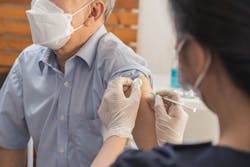COVID-19 vaccine’s effectiveness diminishes with age, UTSW research shows
The Pfizer-BioNTech COVID-19 vaccine limits transmission, hospitalization, and death from COVID-19 even among patients infected by variants of the virus, but the effectiveness of antibodies it generates diminishes as patients get older, according to a study by UT Southwestern researchers.
The emergence of new variants, including Delta and Omicron, left the vaccine less effective at neutralizing SARS-CoV-2 and resulted in increased rates of infection. However, vaccinated individuals, even when infected with COVID-19, continued to be protected against severe disease and death.
To understand how vaccines protect people without completely neutralizing the virus, blood samples were analyzed from 51 adults, ranging in age from 21 to 82, who had not been infected previously with COVID-19 and who each received two doses of the Pfizer-BioNTech vaccine between December 2020 and February 2021. From the samples, the researchers isolated antibodies specific to the SARS-CoV-2 spike protein.
The team showed that the antibodies generated in response to the vaccine were effective at neutralizing the original version of SARS-CoV-2 that emerged in 2019 but, as expected, were not as effective against the Delta and Omicron variants. In addition, the researchers found that these antibodies led to the activation of immune cells that can carry out a variety of antiviral effector functions after infection.
These antibody activities and functions differed by age, with people under 65 carrying significantly more of the activities and functions compared to those over 65. Dr. Lu’s team discovered these observations could be attributed to different sugars attached to the antibodies. With age, these sugars change and antibody functions diminish.

